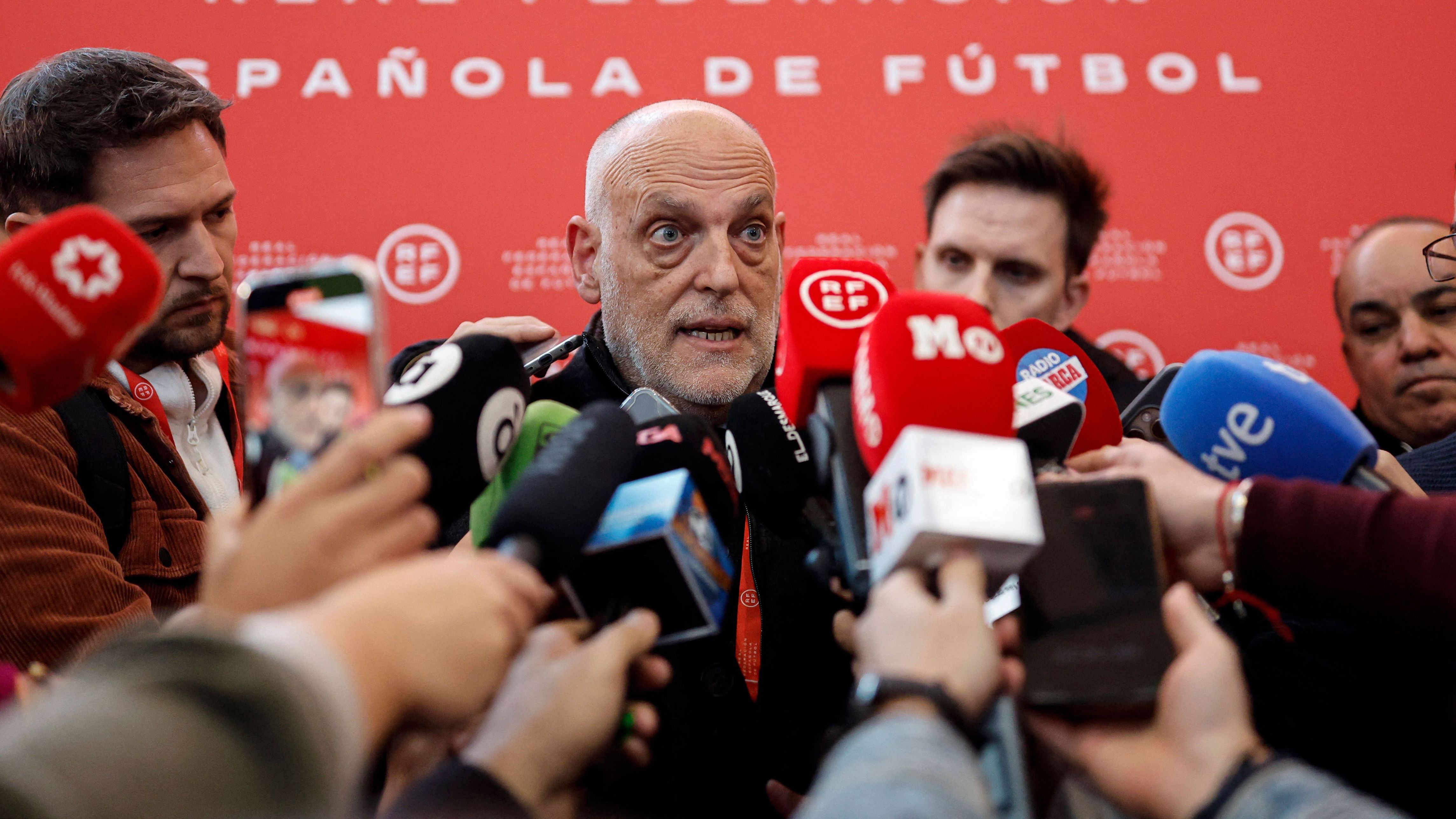


A Major Setback for La Liga’s International Expansion
In a fresh wave of disappointment, La Liga’s efforts to expand globally have encountered yet another obstacle, highlighting the challenges of innovating in the world of football. This incident underscores the tension between tradition and forward-thinking strategies in European soccer, as the league’s plans to stage a key match abroad fell through amid rising uncertainties.
La Liga’s Bid for a US Game Faces Yet Another Roadblock
The Spanish football league’s ongoing pursuit to hold a standard match in the US has suffered a repeated failure. Plans to feature the Villarreal versus Barcelona encounter on December 20 at Miami’s Hard Rock Stadium were abruptly terminated when organizers Relevent pulled out, citing complications stemming from “uncertainty in Spain.” This echoes a previous rejection in 2018, showing the persistent hurdles in La Liga’s cross-border initiatives.
Player Demonstrations and Immediate Backlash
Just prior to the cancellation, athletes from various matches participated in brief 15-second standstills at the start, as a silent form of dissent against the league’s lack of input from stakeholders. Media outlets chose not to broadcast these acts, which only amplified frustration among the teams and their followers. Consequently, La Liga and Relevent announced the event’s cancellation, pointing to inadequate readiness and growing governmental conflicts. Barcelona expressed their endorsement of the decision but lamented the forfeited business prospects.
Tebas Voices Strong Objections to the Cancellation
La Liga’s leader, Tebas, took to social media platform X with a forceful critique, labeling the outcome as “a blow to Spanish football’s prospects” and implicating certain organizations and teams-commonly seen as UEFA and Real Madrid-in hindering advancement.
Tebas’ Critique of Traditional Defenses
“This moment represents a lost chance for Spanish football to evolve, broaden its international reach, and secure long-term stability,” he stated. “Arguments for ‘tradition’ stem from a shortsighted and insular viewpoint, even as the core values of European football are jeopardized by institutional choices that erode domestic leagues-the backbone of the continent’s football economy-due to the oversight and inaction of key figures who blur priorities.”
Challenges to Competition Integrity
“Claims about ‘competition integrity’ come from those who have long undermined it through tactics like influencing officials, spreading misleading stories, or leveraging governmental and press influence for competitive gain.”
Appreciation for Involved Clubs
“I extend my gratitude to Villarreal CF and FC Barcelona for their dedication and selflessness in supporting an initiative aimed solely at elevating our league. Their focus was on collective benefits, not personal ones.”
Future Commitments from La Liga
“We at LaLiga are committed to proceeding with determination and integrity to maintain Spanish football’s competitiveness, countering efforts to undermine it while honoring its heritage and promoting lasting viability. Spanish football should embrace the future with boldness, not apprehension. Our attempts will persist, and this time, we nearly succeeded.”
Growing Tensions Among Stakeholders
The repercussions have deepened rifts between the league, its players, and affiliated clubs. Real Madrid submitted formal objections to Spain’s sports authority, contending that the plan would upset fair play, particularly in a closely contested season. Dani Carvajal described it as “an evident imbalance in the league,” and Barcelona’s coach Hansi Flick acknowledged his players’ discontent.
League-Wide Player Protests
Across La Liga fixtures, participants remained still for the initial 15 seconds, coordinated by the AFE union, to oppose the league’s actions. Goalkeeper Thibaut Courtois denounced the US plan, arguing it would “severely disrupt the competition,” while midfielder Frenkie de Jong shared similar views, deeming it “detrimental to players.”
Contrasts with Other Leagues and Ongoing Debates
In contrast, Serie A has pushed ahead, announcing that AC Milan will face Como in Perth, Australia, in February. This divergence has sparked renewed discussions on whether exporting domestic games represents progress or overreach. La Liga maintains that such moves are essential to rival the financial might of the Premier League and Champions League, whereas critics warn of harm to historical values and fan allegiance.
Looking Ahead Despite the Defeat
Even with the Miami venture’s failure, Tebas affirms that La Liga will “continue its efforts.” The Villarreal-Barcelona game is now set for Estadio de la Ceramica on December 21. This event has triggered fresh examinations of La Liga’s management, claims of referee bias, and Tebas’ persistent clashes with Real Madrid and Barcelona.
Reactions from Club Leadership
Villarreal’s head coach, Marcelino Garcia Toral, condemned the announcement’s timing as “disrespectful,” especially since it came during their Champions League loss to Manchester City. The club plans to issue a comprehensive response.
The Uncertain Path Forward for Global Matches
It remains to be seen if La Liga will pursue another international competitive game. For the moment, attention shifts back to home matches, but the broader conversations on the politics, commerce, and morals of globalizing La Liga are ongoing and intense.
The Controversy Surrounding the Miami Match
Background of the Dispute
In the world of football, decisions about where and how matches are played can stir up significant controversy, especially when they involve international ventures like playing La Liga games abroad. The plan to host a La Liga match in Miami had been a bold move by league officials to expand the sport’s global reach. However, its cancellation highlighted deep-seated rivalries and differing visions within Spanish football.
This issue gained traction when La Liga President Javier Tebas publicly criticized the decision as “narrow-minded,” arguing that it stifled the league’s potential for growth. Tebas, known for his innovative approach to La Liga’s international expansion, has long championed ideas like hosting matches in the United States to tap into growing markets such as Miami’s vibrant football community.
Javier Tebas’s Strong Statements
Javier Tebas didn’t hold back in his remarks, labeling the cancellation a setback for La Liga’s global ambitions. He emphasized how such moves could bring in new revenue streams and engage fans beyond traditional European borders. Tebas’s comments underscored the tension between tradition and innovation in football governance.
In his statements, Tebas accused certain parties of prioritizing short-term interests over the league’s long-term benefits. Specifically, he pointed fingers at Real Madrid, suggesting that the club played a role in undermining the initiative. According to reports from football analysts, Real Madrid’s influence in Spanish football circles might have contributed to the pushback, possibly due to concerns over competitive balance or financial disparities.
- Key quotes from Tebas: He described the opposition as “short-sighted and detrimental,” highlighting how it could affect La Liga’s standing in the global football market.
- Potential motives behind Real Madrid’s involvement: Sources indicate that Real Madrid may have viewed the Miami match as a threat to their own international branding efforts or as an unfair advantage for rival clubs like Barcelona.
Accusations Against Real Madrid
The accusations leveled at Real Madrid by Tebas added a layer of intrigue to the saga, suggesting that the club actively worked to sabotage the Villarreal-Barcelona fixture’s potential relocation. Tebas claimed that Real Madrid’s lobbying efforts influenced key stakeholders, including FIFA and domestic football bodies, to block the move.
This isn’t the first time Real Madrid has been at the center of La Liga controversies; the club has a history of strong advocacy for its interests, which sometimes clashes with league-wide initiatives. Tebas’s claims painted a picture of internal politics where powerful clubs like Real Madrid could sway decisions, potentially at the expense of smaller teams or innovative ideas.
- Bullet points on the allegations:
- Real Madrid’s alleged role: Tebas implied that the club used its influence to highlight regulatory issues, such as player safety and fan logistics, to derail the Miami plan.
- Impact on other fixtures: The Villarreal-Barcelona match, originally considered for relocation, faced scheduling disruptions, which Tebas argued weakened La Liga’s competitive integrity.
- Broader implications: This situation raised questions about how major clubs can influence league policies, potentially leading to calls for more transparent governance in La Liga.
How This Impacts La Liga Fixtures
The cancellation of the Miami match has ripple effects across La Liga’s schedule, particularly for high-profile fixtures like Villarreal-Barcelona. With the league already packed with intense rivalries, such disruptions can alter team preparations and fan experiences.
Experts note that relocating matches abroad could have offered economic benefits, such as increased broadcasting deals and sponsorships, but the fallout has forced La Liga to reevaluate its calendar. For instance, the Villarreal-Barcelona game, known for its tactical battles and star players, might see adjusted venues or times to accommodate fallout.
- Effects on team dynamics:
- Player fatigue and travel: Had the match proceeded in Miami, teams like Villarreal and Barcelona would have dealt with transatlantic travel, potentially affecting performance in subsequent games.
- Fan accessibility: Domestic fans missed out on an opportunity to see La Liga action in a new setting, which could have boosted international viewership.
- Financial aspects: Tebas highlighted lost revenue from ticket sales and merchandise, estimating millions in potential earnings for the league.
Reactions from Fans and Experts
Football enthusiasts and analysts have weighed in on the debate, with opinions split between those supporting Tebas’s vision and others defending traditional formats.
Expert Analysis on La Liga’s Future
Analysts suggest that this incident could prompt La Liga to push for reforms in how international matches are approved. For example, collaborating more closely with FIFA might help avoid similar cancellations in the future. Keywords like “La Liga President Javier Tebas” and “Miami Match controversy” have trended in football discussions, indicating widespread interest.
- H4: Potential long-term changes:
- La Liga might explore hybrid models for fixtures, blending domestic and international elements to satisfy both traditionalists and innovators.
- Clubs could face new regulations on lobbying, ensuring that decisions prioritize the league’s overall growth rather than individual interests.









